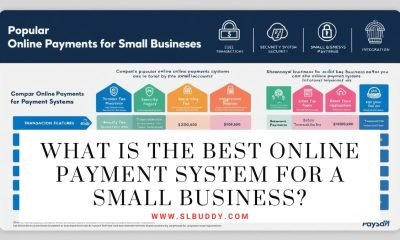
In the world of government contracting, being certified as a Self-Certified Small Disadvantaged Business can provide a competitive edge and open doors to lucrative opportunities.
But what exactly does it mean to be a Self-Certified Small Disadvantaged Business?
In this article, we will delve into the eligibility requirements, benefits, and common pitfalls of self-certification.
We will also provide tips for maximizing the benefits of self-certification and offer strategies for addressing the challenges that Small Disadvantaged Businesses may encounter.
Whether you are just starting your business or are looking to take it to the next level, this article is a must-read for anyone interested in self-certifying as a Small Disadvantaged Business.
What is the Self-Certified Small Disadvantaged Business?
A Self-Certified Small Disadvantaged Business is a type of small business that has been certified by the U.S. Small Business Administration (SBA) as socially and economically disadvantaged.
This certification allows the business to compete for certain federal contracting opportunities set aside for small businesses owned by socially and economically disadvantaged individuals.
Self-certification as a Small Disadvantaged Business can provide numerous benefits to the business, including access to federal contracting opportunities, set-asides, and sole-source awards.
Additionally, the SBA offers various programs and services that are specifically designed to help Small Disadvantaged Businesses succeed.
Eligibility Requirements for Self Certification
The Small Business Administration (SBA) defines the eligibility requirements for self-certification as a Small Disadvantaged Business.
To qualify, a business must meet the size standards set by the SBA and be at least 51% owned and controlled by one or more individuals who are socially and economically disadvantaged.
Additionally, the business must demonstrate good character. Self-certification as a Small Disadvantaged Business offers numerous benefits, including access to federal contracting opportunities, set-asides, and sole-source awards, as well as access to SBA programs and services.
In the following sections, we will explore the self-certification process in more detail and provide tips for maximizing the benefits of certification.
Definition of Small Business Administration (SBA)
The SBA is a government agency that provides resources, support, and guidance to small businesses.
The SBA offers programs and services that are specifically designed to help small businesses succeed, including programs for Small Disadvantaged Businesses.
Eligibility Requirements for Self Certification
To be eligible for self-certification as a Small Disadvantaged Business, a business must meet certain criteria, including:
The business must be at least 51% owned and controlled by one or more socially and economically disadvantaged individuals.
The business must be small, as defined by SBA size standards.
The business owners must be socially disadvantaged, which means they have been subjected to racial or ethnic prejudice or cultural bias because of their identity as members of a particular group.
The business owners must be economically disadvantaged, which means they have a net worth of less than $750,000 and an average adjusted gross income of less than $350,000 over the last three years.
Benefits of Self Certification
Self-certification as a Small Disadvantaged Business can provide numerous benefits to the business, including:
Access to federal contracting opportunities set aside for small businesses owned by socially and economically disadvantaged individuals.
Ability to compete for set-asides and sole-source awards.
Access to SBA programs and services that are specifically designed to help Small Disadvantaged Businesses succeed.
How to Self-Certify as a Small-Disadvantaged Business
Self-certification as a Small Disadvantaged Business can provide access to federal contracting opportunities and SBA programs and services.
However, it is essential to understand the self-certification process, including the steps to self-certify and the required documentation.
In this section, we will provide a detailed overview of the self-certification process, including the eligibility requirements and benefits of certification.
We will also explore the steps involved in self-certification and the required documents needed to demonstrate eligibility.
By following these steps, businesses can increase their chances of success in federal contracting and access important resources and opportunities.
Understanding the Self-Certification Process
The self-certification process for Small Disadvantaged Businesses is relatively straightforward. To self-certify, a business must complete a certification application and provide supporting documentation to the SBA.
Steps to Self-Certify
The steps to self-certify as a Small Disadvantaged Business include:
Registering in the System for Award Management (SAM).
Completing the certification application in the SBA’s Dynamic Small Business Search (DSBS) database.
Providing supporting documentation to the SBA, including proof of ownership, personal financial statements, and tax returns.
Required Documents for Self Certification
The documents required for self-certification as a Small Disadvantaged Business include:
Proof of ownership and control.
Personal financial statements.
Tax returns.
Benefits of Self Certification
Self-certification as a Small Disadvantaged Business offers numerous benefits, including access to federal contracting opportunities, set-asides, and sole-source awards.
These opportunities can help small businesses grow and compete in the federal marketplace.
Additionally, self-certified businesses gain access to SBA programs and services, such as counseling, training, and financial assistance.
In this section, we will explore the benefits of self-certification in more detail and provide information on how small businesses can leverage these opportunities to grow and succeed.
Federal Contracting Opportunities
Self-certification as a Small Disadvantaged Business can provide access to federal contracting opportunities set aside for small businesses owned by socially and economically disadvantaged individuals.
Set-Asides and Sole Source Awards
Small Disadvantaged Businesses may be eligible for set-asides and sole-source awards, which can help them compete for federal contracts.
Access to SBA Programs and Services
Self-certified Small Disadvantaged Businesses can access SBA programs and services that are specifically designed to help them succeed, including mentoring, training, and access to capital.
Common Mistakes to Avoid when Self Certifying
Self-certification as a Small Disadvantaged Business requires careful attention to detail and compliance with eligibility requirements.
Unfortunately, many businesses make common mistakes that can result in denial or revocation of certification.
Inaccurate or incomplete information, failing to meet eligibility requirements, and lack of documentation are among the most frequent errors.
In this section, we will discuss these mistakes in more detail and provide tips on how to avoid them.
By avoiding these pitfalls, businesses can increase their chances of successful self-certification and access to federal contracting opportunities and SBA programs and services.
Inaccurate or Incomplete Information
Providing inaccurate or incomplete information on the self-certification application can result in delays in the certification process or even rejection of the application.
Failing to Meet Eligibility Requirements
Failing to meet the eligibility requirements for self-certification can result in rejection of the application or even loss of the certification status.
Lack of Documentation
Not providing all the required documentation can result in delays or rejection of the application.
Tips for Maximizing the Benefits of Self Certification
Self-certification as a Small Disadvantaged Business provides numerous benefits, including access to federal contracting opportunities, set-asides, and SBA programs and services.
However, to maximize these benefits, businesses must take proactive steps to market their services, network with other small disadvantaged businesses, and stay up-to-date on federal contracting opportunities.
In this section, we will explore tips for maximizing the benefits of self-certification, including marketing strategies, networking opportunities, and how to stay informed about contracting opportunities.
By implementing these tips, businesses can increase their visibility, expand their network, and access more opportunities in the federal marketplace.
Marketing Your Business
Marketing your self-certified Small Disadvantaged Business can help you stand out from the competition and attract potential customers and partners.
Networking with Other Small Disadvantaged Businesses
Networking with other Small Disadvantaged Businesses can help you learn from their experiences and build relationships that can lead to new business opportunities.
Staying Up to Date on Federal Contracting Opportunities
Staying informed about federal contracting opportunities can help you identify potential business opportunities and prepare competitive proposals.
Renewing Your Self Certification
Self-certification as a Small Disadvantaged Business is valid for a limited time and must be renewed periodically to maintain eligibility for federal contracting opportunities and SBA programs and services.
The renewal process involves understanding the timelines for renewal and gathering the required documentation.
In this section, we will explore the renewal process for self-certification, including the timelines for renewal and the documents required for renewal.
By understanding the renewal process, businesses can ensure that they maintain their eligibility for federal contracting opportunities and SBA programs and services.
Understanding the Renewal Process
Self-certification as a Small Disadvantaged Business must be renewed every three years.
Timelines for Renewal
The SBA sends reminders to businesses six months before the certification expiration date, and businesses must submit a renewal application at least 60 days before the expiration date.
Required Documentation for Renewal
The documentation required for renewal includes updated personal financial statements and tax returns.
Maintaining Your Self Certification
Maintaining self-certification as a Small Disadvantaged Business is crucial for businesses to continue accessing federal contracting opportunities and SBA programs and services.
It requires annual affirmations, record-keeping, and responding to changes in the business.
In this section, we will explore the importance of maintaining self-certification and the steps businesses need to take to ensure their eligibility is current.
By maintaining their certification, businesses can continue to access federal contracting opportunities and SBA programs and services, which can be critical to their success.
Annual Affirmations
Small Disadvantaged Businesses must submit annual affirmations to the SBA confirming that they continue to meet the eligibility requirements for self-certification.
Keeping Records
Small Disadvantaged Businesses must keep accurate and up-to-date records to support their eligibility for self-certification.
Responding to Changes in Your Business
Small Disadvantaged Businesses must notify the SBA of any changes that may affect their eligibility for self-certification.
Challenges Facing Self-Certified Small Disadvantaged Businesses
While self-certifying as a Small Disadvantaged Business can provide access to federal contracting opportunities and SBA programs and services, it is not without its challenges.
Self-certified businesses may face competition from other small disadvantaged businesses, struggle to meet contract requirements, and experience cash flow issues.
In this section, we will explore some of the common challenges that self-certified Small Disadvantaged Businesses may encounter and offer strategies to overcome them.
By understanding and addressing these challenges, businesses can increase their chances of success and take full advantage of the benefits of self-certification.
Competition from Other Small Disadvantaged Businesses
The competition for federal contracts among Small Disadvantaged Businesses can be intense, which can make it difficult for businesses to win contracts.
Meeting Contract Requirements
Winning a federal contract is only the first step. Small Disadvantaged Businesses must also be able to meet the contract requirements, which can be challenging.
Managing Cash Flow
Winning a federal contract can be a boon for a Small Disadvantaged Business, but it can also create cash flow challenges as the business waits for payment.
Don’t miss: Best Payment System for Small Business
Self-Certified FAQs
Self-certification as a Small Disadvantaged Business can provide numerous benefits, including access to federal contracting opportunities and SBA programs and services.
However, it is important to understand the eligibility requirements and the self-certification process to avoid common mistakes and maintain certification.
Here, I will answer five frequently asked questions regarding self-certification as a Small Disadvantaged Business, including the eligibility requirements, benefits, common mistakes to avoid, renewal process, and challenges faced by self-certified Small Disadvantaged Businesses.
What are the eligibility requirements for self-certification as a Small Disadvantaged Business?
To self-certify as a Small Disadvantaged Business, the business must be at least 51% owned and controlled by one or more individuals who are socially and economically disadvantaged, meet the small business size standards set by the Small Business Administration (SBA), and demonstrate good character.
What are the benefits of self-certification as a Small Disadvantaged Business?
The benefits of self-certification include access to federal contracting opportunities, set-asides, and sole-source awards, as well as access to Small Business Administration (SBA) programs and services.
What common mistakes should businesses avoid when self-certifying as a Small Disadvantaged Business?
Businesses should avoid providing inaccurate or incomplete information, failing to meet eligibility requirements, and not providing all required documentation.
How often must self-certified Small Disadvantaged Businesses renew their certification?
Self-certified Small Disadvantaged Businesses must renew their certification every three years.
What are some challenges faced by self-certified Small Disadvantaged Businesses?
Some challenges faced by self-certified Small Disadvantaged Businesses include intense competition from other Small Disadvantaged Businesses, meeting contract requirements, and managing cash flow.
Don’t miss: Benefits and Uses of Library in Small Companies
The bottom line
Self-certification as a Small Disadvantaged Business can provide numerous benefits, including access to federal contracting opportunities, set-asides, and sole-source awards.
Small businesses that meet the eligibility requirements for self-certification should consider applying for certification to take advantage of the benefits available.
Self-certification as a Small Disadvantaged Business can be a valuable tool for small businesses looking to grow and compete in the federal marketplace.
However, it is important for businesses to understand the eligibility requirements, the certification process, and the ongoing responsibilities associated with maintaining the certification status.










